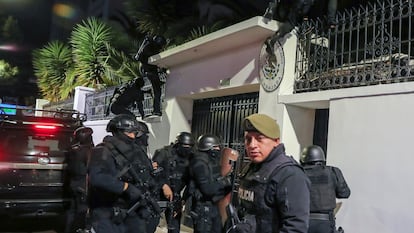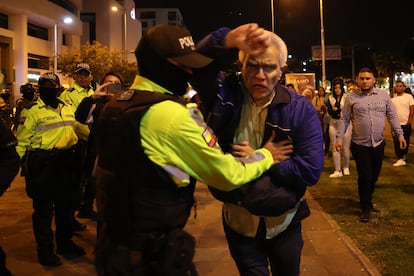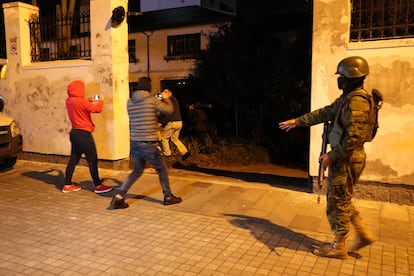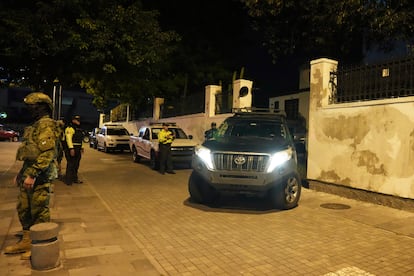Mexico breaks diplomatic ties with Ecuador after police raid Mexican embassy in Quito
Ecuadorian police forces burst into the site with armored cars and arrested former vice president Jorge Glas, who is convicted in two cases of corruption and had been granted political asylum by Mexico. President López Obrador has described the assault as a ‘flagrant violation of international law and sovereignty’

The president of Ecuador, Daniel Noboa, has forcefully challenged his Mexican counterpart, Andrés Manuel López Obrador. The Ecuadorian police raided the Mexican Embassy in Quito on Friday night, entering with armored cars and masked officers to forcibly remove former vice president Jorge Glas, who had received political asylum from the López Obrador government just hours before.
Glas — former president Rafael Correa’s right-hand man — was once one of the most powerful politicians in Ecuador. Correismo even considered naming Glas as its candidate in the last presidential elections in 2023, which were won by Noboa. Glas, however, declined the nomination. In the hours following the 2023 election, he was to receive safe passage from Ecuadorian authorities that would allow him to fly to Mexico City, but instead Noboa ordered his immediate capture.
Glas — who in December sought refuge in the Mexican embassy when a judge requested his arrest — has two convictions for corruption, of which he has served five years in prison. On Friday, the police stormed the embassy, breaking the bars with bolt cutters and shaking a Mexican diplomat who was trying to prevent the violation of consular space, which is protected by international law. The agents took Glas away in a black van with tinted windows.
The head of the embassy’s Foreign and Political Affairs Department, Roberto Canseco, was inside the building when the police burst in. “At the risk of my life, I defended the honor and sovereignty of my country. This cannot be, it is unbelievable that something like this has happened. I am very worried because they could kill him [Glas]. There is no basis to do this. We were about to leave and suddenly we were met with police, with thieves who entered the embassy at night,” he said.
In response to the embassy raid, López Obrador announced almost immediately that Mexico was breaking diplomatic ties with Ecuador. “This is a flagrant violation of international law and the sovereignty of Mexico, for which I have instructed our foreign minister to issue a statement on this authoritarian act, proceed legally and immediately declare the suspension of diplomatic relations with the government of Ecuador,” López Obrador wrote in a message on social media.
Mexico’s Secretary of Foreign Affairs, Alicia Bárcena, added that the right to asylum is sacred and asked all Mexico’s diplomatic personnel to leave the country. Mexico will go to the International Court of Justice to “denounce Ecuador’s responsibility for violations of international law,” she said. The Vienna Convention establishes that embassies are territories of national sovereignty and are inviolable.

Glas — who was vice president under Correa — took refuge in the Mexican embassy to avoid going to prison again. He has already served five years for two corruption cases. Correa lives in Belgium and cannot return to his country, as he faces an eight-year prison sentence and ban from office over a corruption conviction he says is a case of political persecution. Correa’s supporters claim that the cases against Glas and Correa are an example of lawfare.
The tension between Mexico and Ecuador intensified this week after Noboa’s government declared the Mexican ambassador to Ecuador, Raquel Serur, persona non grata in response to remarks by López Obrador, in which he implied that Noboa won the elections thanks to the murder of presidential candidate Fernando Villavicencio at the hands of organized crime hitmen
Mexico responded by granting political asylum status to Glas, who was awaiting a special authorization that would allow him to leave the country. Noboa’s government flatly refused and argued that such asylum was illegal. His next step was the raid on the embassy, which has further strained Ecuador’s relationship with Mexico and will likely affect the country’s relations with other nations in the region.

The two protagonists of the diplomatic spat could not be more different. López Obrador has been in elected office all his life and has been part of several left-wing political parties until he founded his own, Morena, which now has a majority in Mexico’s Congress.
Noboa, in contrast, is the son of Ecuador’s richest businessman and did not think he would win the presidential elections in 2023. But the campaign shifted following the assassination of Fernando Villavicencio, creating conditions that favored Noboa and catapulted him to the presidency. Since taking office, he has adopted the iron-fist policies that Salvadoran President Nayib Bukele has used to curb gang violence.
But Noboa and López Obrador are linked by one factor: they both have widespread popular support. There is a good chance that an ally of the Mexican president will win this year’s election, and if there is no change in Ecuador, Noboa is on track to be re-elected in 2025. Correismo would like to come to power to review the cases of Correa and Glas, but now Noboa is standing in the way.
Now he has fallen from grace, but Glas became one of the most powerful politicians in Ecuador during the 10 years that the Citizen Revolution, the leftist socialist movement led by Correa, was in power. He began coordinating the electricity and telephone companies and then took charge of the Coordinating Ministry of Strategic Sectors, one of the most important in the state structure. He was responsible for Ecuador’s public policy on oil, mining, electricity, telecommunications and water resources.
At that time, Ecuador was seeing great development thanks to oil and raw materials. Back then, it came out that he plagiarized his thesis to graduate as an engineer and that his father, a school principal, was sentenced for raping a 13-year-old student whom he left pregnant.

In his rise to power, Glas was twice appointed vice president, first with Correa and then with Lenin Moreno. It was his moment of greatest glory, but also the beginning of the end. Glas was convicted for illicit association in the Odebrecht case, in which he was sentenced to six years in prison. Shortly after the sentence, he was also found guilty of bribery in the Bribery case, for which he was sentenced to eight years in prison. Both investigations placed Glas at the head of a corruption network that, together with Correa and several other government officials, negotiated contributions from multinational companies for Alianaza PAÍS, the political arm of the Citizen Revolution.
In addition to the two sentences for corruption that he should be serving in the Cotopaxi prison, the former vice president is also currently being investigated for embezzlement. According to the Public Prosecutor’s Office, he diverted public funds that should have been gone towards works to reconstruct the provinces of Manabí and Esmeraldas, which were affected by the 2016 earthquake.
Prosecutor Diana Salazar argued that the framework for the earthquake emergency was used “to circumvent public procurement procedures,” with at least $368 million spent on non-urgent works. At an arraignment hearing, she convinced the judge to order Glas to be held in preventive detention.
Before the court order was issued, Glas took refuge in the Mexican embassy. He thought he was safe there, and Correa even celebrated the move on social media. But no one was expecting that Noboa would try to arrest him at any cost, even if it meant destroying relations with a country as powerful as Mexico. The diplomatic conflict between Noboa and Lopez Obrador has only just begun.
Sign up for our weekly newsletter to get more English-language news coverage from EL PAÍS USA Edition
Tu suscripción se está usando en otro dispositivo
¿Quieres añadir otro usuario a tu suscripción?
Si continúas leyendo en este dispositivo, no se podrá leer en el otro.
FlechaTu suscripción se está usando en otro dispositivo y solo puedes acceder a EL PAÍS desde un dispositivo a la vez.
Si quieres compartir tu cuenta, cambia tu suscripción a la modalidad Premium, así podrás añadir otro usuario. Cada uno accederá con su propia cuenta de email, lo que os permitirá personalizar vuestra experiencia en EL PAÍS.
¿Tienes una suscripción de empresa? Accede aquí para contratar más cuentas.
En el caso de no saber quién está usando tu cuenta, te recomendamos cambiar tu contraseña aquí.
Si decides continuar compartiendo tu cuenta, este mensaje se mostrará en tu dispositivo y en el de la otra persona que está usando tu cuenta de forma indefinida, afectando a tu experiencia de lectura. Puedes consultar aquí los términos y condiciones de la suscripción digital.








































